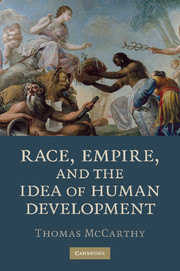Conclusion: the presence of the past
Published online by Cambridge University Press: 05 June 2012
Summary
Men make their own history, but they do not make it as they please, they do not make it under circumstances chosen by themselves, but under circumstances directly found, given and transmitted from the past. The tradition of all the dead generations weighs like a nightmare upon the brain of the living.
Karl MarxThe modernization of the West was tied to globalization from the start, and racial formations were integral to that process: racial classifications had constitutive significance for the slave trade, the dispossession and removal of indigenous populations, colonial labor regimes, institutionalized segregation and discrimination, ethnoracial forms of nationalism, restrictive immigration policies, and other central structures of the modern world order. Those structures were not merely – “superstructurally” – justified by racist ideologies, they embodied them: racist schemes of interpretation and evaluation were essential to the intelligibility and normativity of the organized practices that produced and reproduced the order. As the spread of racial domination accompanied the rise of liberalism – with its emphasis on freedom and equality – and the emergence of enlightenment humanism – with its emphasis on universal reason – there were issues of legitimacy at every step. I have defended the view that the infusion of liberal and enlightenment thought with developmental thinking proved to be the most effective means of addressing them. Other cultures, peoples, and societies became bypassed stages of Western development, and thus in need of tutelage – in the form of benevolent despotisms, civilizing missions, and the like – before they could catch up to the West.
- Type
- Chapter
- Information
- Race, Empire, and the Idea of Human Development , pp. 230 - 243Publisher: Cambridge University PressPrint publication year: 2009



